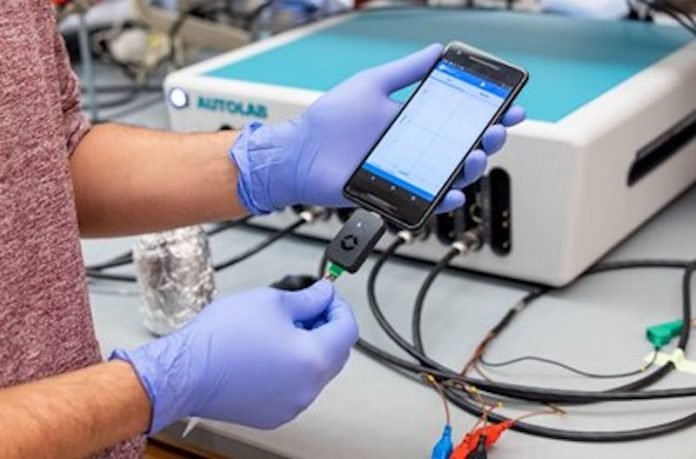
In a new study from Penn Medicine, researchers found a low-cost, rapid diagnostic test for COVID-19 provides COVID-19 results within four minutes with 90% accuracy.
The fast and inexpensive diagnostic test is called RAPID 1.0 (Real-time Accurate Portable Impedimetric Detection prototype 1.0).
Compared to existing methods for COVID-19 detection, RAPID is inexpensive and highly scalable, allowing the production of millions of units per week.
Despite the urgency of the pandemic, most available methods for COVID-19 testing use RT-PCR—reverse transcription-polymerase chain reaction—to detect SARS-CoV-2.
Though effective, the technique requires large laboratory space and trained workers to employ. These tests are also costly, they run a risk of cross-contamination, and can take hours or days to provide results.
In the study, the team developed RAPID to quickly and accurately detect the virus while remaining cheap enough to be widely accessible.
An electrode printed using a screen printer—thousands of which can be printed in a day at a very low cost—can detect the virus in nasal swab or saliva samples. The results can be read on a benchtop instrument or on a smartphone.
The team assessed the performance of RAPID using both COVID-19 positive and negative clinical samples from the Hospital of the University of Pennsylvania, including samples of the highly contagious UK B117 variant.
They analyzed 139 nasal swab samples—109 of which were COVID-19 positive and 30 COVID-19 negative, as determined by standard RT-PCR clinical assessments.
The team also analyzed 50 saliva samples from patients. For the nasal swab samples, RAPID was 87.1% accurate. For saliva samples, RAPID was 90% accurate.
RAPID provides results in four minutes, which is faster than most methods currently available for diagnosing COVID-19.
In addition, RAPID is able to detect COVID-19 at extremely low concentrations (1.16 PFU mL), which corresponds to a viral load that correlates with the initial stages of COVID-19 (about two to three days after onset of symptoms).
This is beneficial for detecting individuals at the earliest stages of infection, allowing for rapid care and the potential decrease of further viral spread.
Importantly, the technology is affordable and scalable. Each test, which can be performed at room temperature, costs $4.67 to produce.
Additionally, the electrodes used in the test can be quickly mass-produced using commercially available screen-printers to print the circuit board (named eChip).
One laboratory-sized unit is able to produce 35,000 electrodes daily (about 1.05 million per month).
If you care about COVID-19, please read studies about people with these blood types may have lower risk of severe COVID-19 and findings of people with this health problem three times more likely to die in COVID-19.
For more information about COVID-19 prevention and treatment, please see recent studies about two-drug combo that treats COVID-19 effectively and results showing that this drug can prevent 100% of symptomatic COVID-19 infections.
The study is published in Matter. One author of the study is César de la Fuente, Ph.D.
Copyright © 2021 Knowridge Science Report. All rights reserved.



